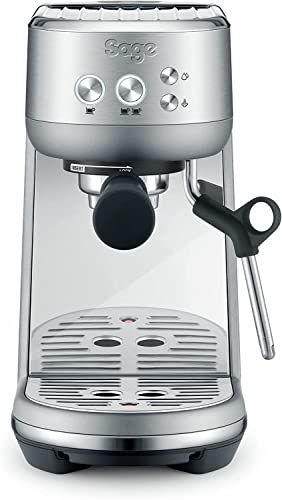What to Look For in a Commercial Espresso Machine
 When buying a commercial coffee machine, there are many factors to consider. Your cafe’s volume, intended use for service, and barista’s experience will determine which espresso machine is right for your business.
When buying a commercial coffee machine, there are many factors to consider. Your cafe’s volume, intended use for service, and barista’s experience will determine which espresso machine is right for your business.
A double boiler system allows you to brew while steaming. It also decreases the time between pulls. Proportional-integral-derivative (PID) temperature control manages on/off cycles for optimal boiler temperatures.
Productivity
A commercial espresso machine is able to handle a higher amount of coffee than a home machine. Expecting a domestic espresso machine to work in a professional space would be a recipe for disaster.
A commercial machine of the highest quality can serve up to 100 cups per hour during peak hours. This can be a lifesaver for busy workplaces, keeping employees from waiting around while waiting to get their coffee.
A coffee machine at work can aid workers in bonding with each other. Oftentimes teams of people will be able to swap coffee each other, and this can help encourage collaboration and teamwork in the workplace. A dedicated coffee area could help new employees feel more at ease at work and break down the barriers between them, senior employees and other employees.
Commercial espresso machines come in various sizes to cater for different needs. Some models are fully automated while others have the ability to pre-program espresso shots so that operators aren’t required to guess the correct size. This is particularly crucial for companies with untrained baristas since incorrect shots can alter the intensity and taste of espresso. In addition, it’s best ground Coffee for espresso machine to purchase ethically-sourced and commercial espresso machines that help the communities where coffee is cultivated. This will guarantee a high quality product, and reduce the negative impact on the environment.
Safety
Espresso machines are big heavy pieces of equipment that can cost more than a brand new compact car. The machines are designed to make hundreds of shots and drinks in a single day. The high volume of operations create some unique work risk to health and safety for staff members, so it’s important to consider the risks that could be associated with an espresso machine that is commercially used.
It’s important to keep in mind that a commercial espresso machine is likely to function with warm water, which could cause the development of bacteria. Machines that are poorly maintained and not regularly cleaned and descaled will accumulate spent espresso. This can cause it to turn rancid and may cause illness when consumed by customers. A commercial espresso machine with a steam wands that are not sealed can allow bacteria to flourish in the milk foaming process.
Consider the type of beverage you will serve and the number of cups per hour can be served when selecting a commercial coffee machine. You’ll also want a machine that offers automated features, which make it faster and easier to serve your patrons their preferred coffee drink. In addition, you should look for a warranty that includes parts and labor so that any technical issues can be dealt with quickly and efficiently.
Energy Efficiency
Commercial espresso machines require substantially more power than home models. This is due to the fact that professional espresso machine espresso machines are built with heavier frames and large capacity boilers to handle the multiple group heads required for normal cafe production. These machines operate at higher temperatures, and are usually located in indoor areas (such as in a coffee shop or restaurant) where the electronic components may overheat.
The boiler of commercial espresso machines heats and stores pressurized water that is supplied by an electric pump. The water is then used to brew and steaming espresso. The boiler is comprised of several copper tubes heated by electric elements. When the brew sensor determines that the water level has reached its target level the solenoid valve opens and fills the boiler with new water. The heating element is then shut off.
There are four types of espresso machines, distinguished by their ability to brew and steam with steam: TB (brewing only), TX (twin boilers) HX, DA (double automatic). TB and TX machines provide stable brew temperatures, whereas DA can provide rapid steaming using a single boiler. HX machines are used by many cafes as they provide the highest quality in both steam and brew temperature.
Maintenance
Commercial espresso machines need regular maintenance as do cars. They need to be maintained in order to run smoothly and efficiently. If you ensure that you maintain your machine in good condition, it will provide you a better tasting espresso and last longer.
It’s a regular practice to clean your espresso machine, however you should pay attention to the parts that require an extra clean. There will be a residue from coffee grounds and milk products in the machine that can degrade various components over time. Regular cleaning can help prevent this and keeps your espresso machine functioning at its best.
The majority of commercial espresso machines require descaling every three months. This is a process that requires more steps than regular cleaning, so be sure to read the manual to ensure that you’re following the instructions. The solution used to descal the tank dissolves the scale. In order to complete this process you’ll need to place a container underneath the steam wand or, in some models, beneath the coffee spouts. Follow the steps for the model you have chosen.
Another maintenance step includes changing the water filters. It’s easy to overlook but it’s crucial not to build up mineral deposits. It is also important to look for Retro Espresso Machine calcification in the spray head, which is difficult to eliminate.
